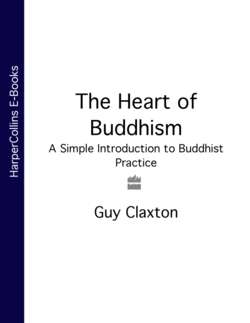Читать книгу The Heart of Buddhism: A Simple Introduction to Buddhist Practice - Guy Claxton - Страница 11
Two things Buddhism is not
ОглавлениеOne of the biggest misapprehensions about Buddhism is that it is an escape from life, either into a quiet fatalism or into the safety of mental contemplation. Nothing could be further from the truth. The enquiry is no mere intellectual exercise, with painful realities kept nicely at a distance. Rather it involves a continual rubbing of your nose in the everyday messes of your own devising, so that you actually learn from your experience. The author of a recent academic book about Zen Buddhism, T.P. Kasulis, describes his meeting with a Japanese Master.
“You have asked permission to practise Zen meditation in this temple, but tell me: what is Zen?” inquired the Master. After some hesitation and embarrassed smiling, I said something about Zen’s being a way of life rather than a set of dogmas. Laughter filled the tatami-matted reception room. “Everyone comes here to study Zen, but none of them knows what Zen is. Zen is knowing thyself. You are a Western philosopher and know of Socrates’ quest. Did you assume Zen would be something different?”
If we do not have to travel East to tatami-matted rooms, neither do we have to go back to the Greeks. Here is a character in one of Dick Francis’s novels, The Danger, talking:
“To be logical you have to dig up and face your own hidden motives and emotions, and of course they’re hidden precisely because you don’t want to face them. So ... um ... it’s easier to let your basement feelings run the upper storeys, so to speak, and the result is rape, quarrels, love, jobs, opinions, anorexia, philanthropy ... almost anything you can think of. I just like to know what’s going on down there, to pick out why I truly want to do things, that’s all. Then I can do them or not. Whichever.”
He looked at me consideringly. “Self-analysis ... did you study it?”
“No. Lived it. Like everyone does.”
He smiled faintly. “At what age?”
“Well ... from the beginning. I mean, I can’t remember not doing it. Digging into my own true motives. Knowing in one’s heart of hearts. Facing the shameful things ... the discreditable impulses ... Awful, really.”
The more common attitude was well expressed by Peter Cook and Dudley Moore in one of their sketches. Moore was interviewing Cook about his disastrous attempt to start up a restaurant in the middle of Dartmoor (serving, as I recall, only two dishes – Frog à la Peche, and Peche à la Frog, both equally disgusting). He asked whether Peter Cook thought he had learnt from his mistakes, to which Cook replied, ‘Oh yes. A tremendous amount. And I think I can safely say that I could repeat them almost perfectly.’
The discipline of Buddhism is to learn to look at yourself unflinchingly, especially when you don’t like what you see, so that you can gain practical insight into what makes you tick, and therefore a clearer sense of what it might be possible to do for the best. The effect of Buddhism is not only that of feeling more at peace with yourself, but a more intelligent and skilful involvement in life – career choices, social action, family disputes, whatever.
This brings up another quite common reaction to Buddhism: that its concern – some would say its obsession – with ‘suffering’ is depressing and unhealthy. Indeed, from the point of view of the more usual attempt to deal with trouble by trying to ignore it, it does look perverse. Why on earth would anyone want to dwell on the bad stuff? We cannot really answer this yet, for to do so we have to get right into the core of Buddhism. All we can say is that people discover for themselves that the attempt to avoid the hurt and pain of living is more trouble than it is worth, and that equanimity can be found by staring distress in the face, not by running away from it, or trying to do battle with it. The Buddhist emphasis on ‘suffering’ is not masochistic, but an unsentimental, clear-sighted, pragmatic response to the problem of how to be as happy as possible in a life that is bound to hit you from time to time.
